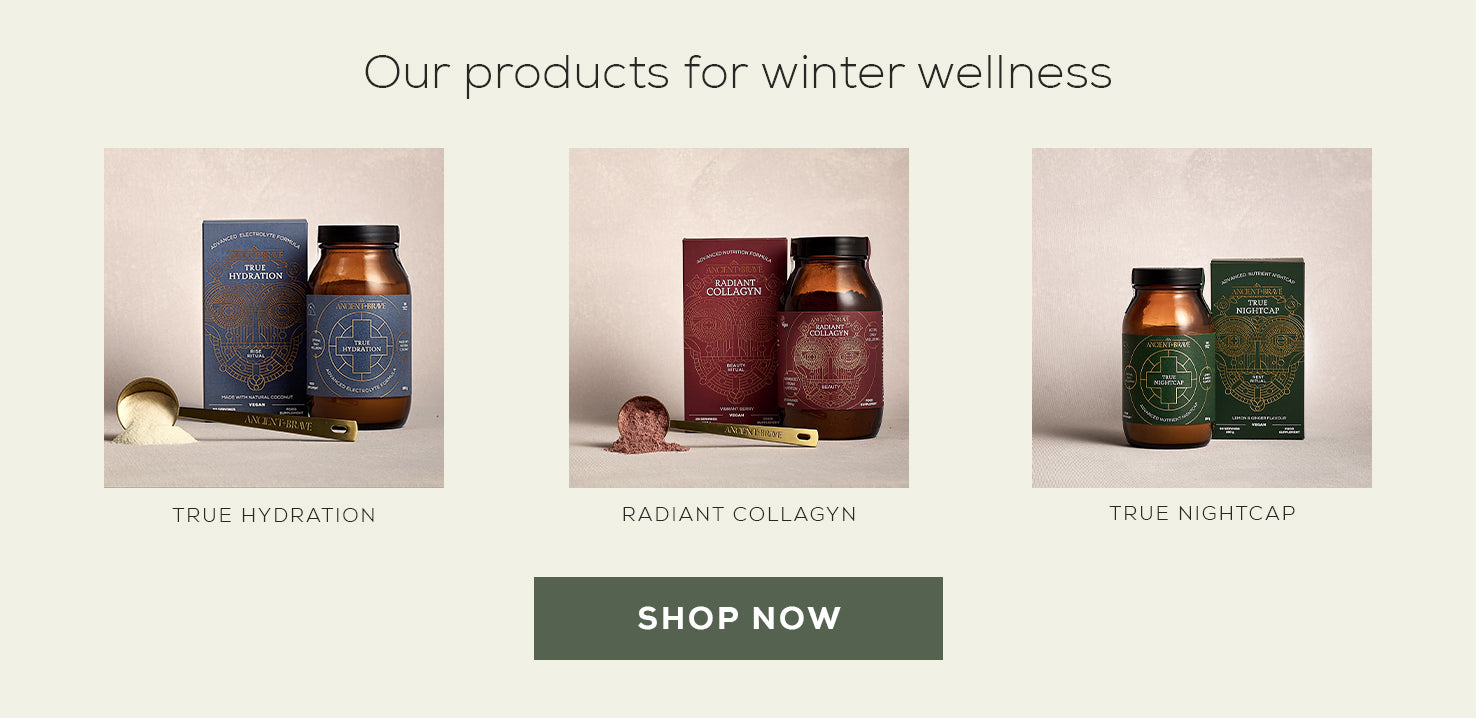
Winter Wellness and Intuitive Immunity
6 Min read
Introduction
As the chill of winter sets in, the days grow shorter and the festive frenzy is merely weeks away, it's essential to prioritise wellness and support your immune health. Not only can winter be tough on your health with holiday preparations, increased social obligations and end-of-year work deadlines, but it can feel like germs are waiting around every corner. And in some ways they are!
Winter viruses that cause things like colds, flu and other upper respiratory symptoms love the cooler climes of winter. These germs are more stable in cold, dry air which helps them transmit between people. This is one of the reasons why we are more likely to fall sick in winter. The cold, dry air can irritate our respiratory passages, making it easier for viruses to infect. We tend to stay indoors more often with windows closed and close to others increasing the likelihood of viral transmission. And from October to April the sun in geographical latitudes above 40°N (this means anywhere north of Madrid in Europe) is a high risk of vitamin D deficiency. In fact, without supplementation, your vitamin D levels will fall by half between now and March.
To mitigate the toll on your health during the next few months, it's essential to prioritise immune-centric self-care. This includes both preventative measures to avoid getting unwell as well as a well-thought-out plan in case you do fall sick.

Prevention is better than cure.
During the winter, we can do our best to avoid germs by employing a variety of strategies. I like to call it the ‘Swiss Cheese’ Model as a way to conceptualise the importance of multiple layers of defence working together to reduce the risk of getting ill in the first place. Each layer of defence is represented by a slice of Swiss cheese, and the holes in the cheese represent potential weaknesses or failures in that layer. When multiple layers are aligned, the chances of an infection slipping through all the holes are greatly reduced. The first layer is avoidance. This might mean increasing ventilation when indoors, practising good hygiene and tissue etiquette and avoiding close contact with people who are sick. The other layers focus more on diet and lifestyle measures. For example, it's crucial to maintain a well-balanced diet rich in seasonal produce. Eating seasonally is not only good for the environment but can also have a profound impact on our health, especially during the winter months. The nutrients in winter produce naturally align with nutritional requirements in winter. Think bright orange pumpkins and squashes full of beta-carotene, the plant-based vitamin A, also known as the ‘anti-infective’ vitamin. It’s a fat-soluble vitamin so roast up those roots in a lovely olive oil and some hardy winter herbs bursting with immune-supporting phytonutrients. Winter citrus fruits provide vitamin C, an essential nutrient for immune function. Winter berries like elderberry support the function of vitamin C through their rich bioflavonoid content as well as antiviral compounds. Winter crucifers like Brussels sprouts, support several aspects of immune health as well as liver detoxification to remove things like any extra alcohol from festive parties. Fibre from a diversity of plants will feed and fertilise the gut microbes. These immune-health allies will then train and educate our immune system, helping it to respond appropriately if we do fall sick. Don’t forget the importance of protein to build all the immune cell armies and antibodies needed to fight infections. Add a scoop of Collagen to your daily routine to increase your protein intake. Finally, omega-3 fats are essential for proper immune function and help prevent unwanted inflammation. If you don’t eat oily fish 2x per week, it is recommended to supplement.
Other layers of ‘Swiss Cheese’ include drinking plenty of water and staying hydrated with electrolytes like True Hydration. This helps keep your mucous membranes moist, which can help prevent infections. Adequate sleep is a cornerstone of good health. During the winter months, it's common to feel more fatigued due to the shorter day length. Aim for a consistent 7-9 hours of quality sleep per night to allow your body to rest and recover. Staying active is a fundamental that makes your immune system work via lymphatic flow. Try to keep up with outdoor physical activities as well as indoor activities like yoga, Pilates, or hitting the gym. Finally, don't neglect the psychological influence on immune health. Chronic stress can weaken your immune system. As we head into the festive frenzy, be sure to arm yourself with stress-reduction techniques like meditation, deep breathing or engaging in hobbies that bring you joy.

What to Do If You Fall Sick
If you are exposed to people, then you are exposed to germs. This means it's normal for healthy adults to pick up a few minor illnesses each winter. At the onset of those familiar yet uncomfortable symptoms, I recommend prioritising two things; rest and time. Your immune system is exceptionally busy preparing armies to fight off the intruders. This is highly energy intensive and some aspects of an immune response can take several days. There is a reason you don’t feel up to doing your normal activities. It’s a sign from your immune system to slow down and rest. Your body needs extra energy to fight off infections, so take it easy. To prevent the spread of illness and prolonging of symptoms, stay home and avoid close contact with others until you feel better.
Be sure to stay hydrated. Warm drinks like herbal teas, or the classic combo of lemon and ginger in our True Nightcap can soothe a sore throat and help ease congestion. Not just for night, it also contains zinc and vitamin C which are needed in higher amounts when fighting off germs. I also love Radiant Collagyn with its bright purple berries packed with vitamin C, and it also contains vitamin D, both of which are very important for immune function. Try to consume nourishing foods like soups made with bone broth which is particularly nourishing for our immune system. Not only does bone broth provide a generous amount of minerals and make a great base for nourishing soups and stews but it provides an absorbable form of protein without the bulk of a meat-heavy meal. It contains the valuable building blocks for our bodies to make Glutathione - a highly important antioxidant that acts upstream of other antioxidants such as vitamins C and E. And it is rich in cysteine which helps break down mucus in your lungs and carnosine acts directly on inflammatory cells called neutrophils to calm their toxic effects as they fight infections in your airways. So there is a thread of truth in that chicken soup could cure your cold.
Winter self-care and immunity go hand in hand. Although unpleasant, most minor illnesses should be resolved in a timely way with rest and home remedies. Over-the-counter remedies generally target symptoms so you feel better temporarily but by doing so, can suppress the immune response. By proactively taking steps to support your health and knowing what to do if you fall sick, you can navigate the winter months with ease and minimise missing out on festive fun. Remember, the key to a healthy winter is a balanced approach that includes nutrition, hydration, rest and of course being kind to yourself if you do fall sick. Stay well!






